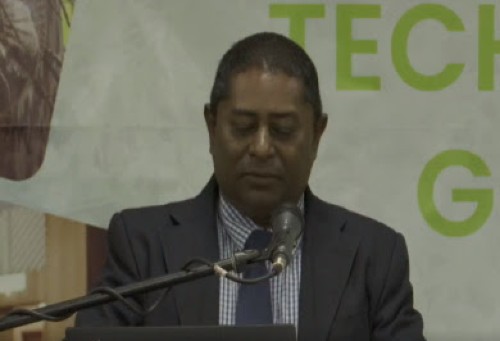Grenada Developing Food Security Crisis Preparedness Plan
ST. GEORGE’S, Grenada – Grenada says it has started the process of developing a food security crisis preparedness plan (FSCPP) aimed at defining what constitutes a major food and nutrition security crisis for the country in the event of a national hazard or external shocks such a global health pandemic.
 Isaac Bhagwan, Permanent Secretary in the Ministry of Agriculture., addressing the two-day workshop on Wednesday (CMC Photo)The Ministry of Agriculture Wednesday opened a two-day workshop for several stakeholders who were urged to regard the plan as initiative that will work in the best interest of the island.
Isaac Bhagwan, Permanent Secretary in the Ministry of Agriculture., addressing the two-day workshop on Wednesday (CMC Photo)The Ministry of Agriculture Wednesday opened a two-day workshop for several stakeholders who were urged to regard the plan as initiative that will work in the best interest of the island.
“It will help define the role of various organisations and agencies, it will also look at the timeline for the implementation for early warning and to look at the institutional framework. In other words, this food security crisis preparedness plan needs to be driven by data,” said Isaac Bhagwan, Permanent Secretary in the Ministry of Agriculture.
Bhagwan told the opening ceremony that the data must be collected and analysed and “must be able to speak to the issue that is affecting us and these are the information that will be given to our policymakers such as the cabinet and other senior government officials who need to make decisions”.
He said that the government in September last year, requested a loan of US$10 million from the World Bank under the Crisis Response Window Early Response Financing Facility (ERF) as part of its strategic plan to respond to the worsen acute food security condition.
He said that as part of the condition of the loan, Grenada is expected to develop an operational food security crisis preparedness plan that will allow stakeholders, on a timely basis, to determine what is happening and be able to identify the necessary triggers and the action that has to be taken.
Bhagwan said that there is a tendency to think about food crises around hurricane time but there are other factors such as the outbreak of pest and disease, the issue of climate change, civil and political unrest and the list can go on.
“All these can influence food availability and the quality of food, we need to define these triggers and what will constitute a crisis,” he added.
According to the World Bank, the plan should also explain how crisis risks are actively monitored and identified, and details step-by-step protocols, roles, and timelines for mobilizing additional funding and early action.
“The FSCPP brings together these preparedness elements into a cohesive operational framework to support the systematic recognition of an emerging crisis and prompt timely joined-up action across government, humanitarian, and development partners to prevent and mitigate the impacts of future food and nutrition security crises,” the Washington-based financial institution said.
While the FSCPP is a World Bank requirement associated with receiving support from the ERF, it extends beyond the World Bank’s engagement and represents the country’s national plan.
The other countries in the Latin America and Caribbean region developing similar plans are St Vincent and the Grenadines, Dominica, Haiti, St Lucia and Honduras.


